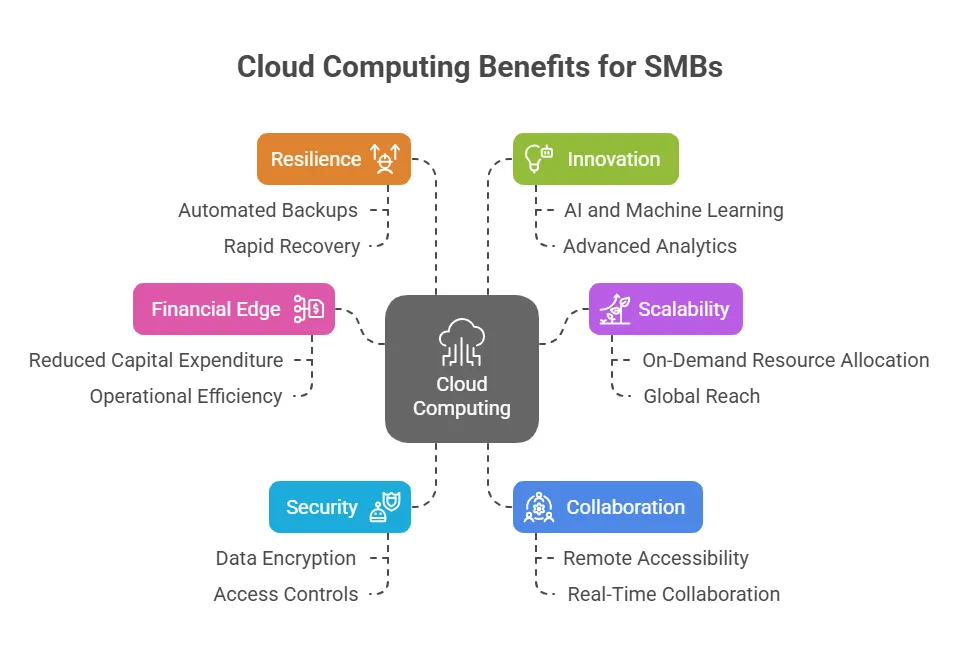Small and mid-sized businesses (SMBs) face mounting pressure to innovate and adapt. Relying solely on traditional on-premises infrastructure can lead to escalating costs and limited agility. By 2025, 85% of organizations will embrace a cloud-first principle.
As Philipp Graves, CEO of Antisyn, says, “Your next competitive edge won’t come from hardware, it’ll come from the cloud.”
So, why is cloud computing important for SMBs? Let’s delve into the compelling reasons driving this shift.
Make the Cloud Work for You, Not Against You
Antisyn delivers cloud solutions that support real business growth from security to scalability.
Cut Costs, Not Corners: Cloud Computing’s Financial Edge
Traditional IT setups demand significant capital for hardware, software licenses, and maintenance. Cloud computing transforms these capital expenses into predictable operational costs. By adopting cloud solutions, SMBs can reduce upfront investments and pay only for the resources they use.
Key Financial Benefits:
- Reduced Capital Expenditure: Eliminates the need for costly hardware and infrastructure investments.
- Operational Efficiency: Streamlines IT operations, reducing the need for extensive in-house IT teams.
- Scalable Pricing Models: Offers pay-as-you-go models, allowing businesses to align costs with actual usage.
- Lower Maintenance Costs: Shifts maintenance responsibilities to cloud providers, freeing up internal resources.
By leveraging cloud computing, SMBs can allocate resources more strategically, focusing on growth and innovation rather than infrastructure management.
Scale Smart: How the Cloud Grows with Your Business
One of the standout advantages of cloud computing is its scalability. As your business grows, cloud services can seamlessly adjust to increased demands without the need for significant infrastructure changes. This flexibility ensures that SMBs can respond swiftly to market opportunities and challenges.
Scalability Advantages:
- On-Demand Resource Allocation: Quickly scale resources up or down based on business needs.
- Global Reach: Deploy applications and services across multiple regions effortlessly.
- Agility: Accelerate time-to-market for new products and services.
- Cost-Effective Scaling: Avoid over-provisioning by scaling resources precisely when needed.
Embracing cloud scalability empowers SMBs to remain competitive and responsive in a dynamic business environment.
Secure by Design: Cloud Computing’s Built-in Protections
Security remains a top concern for businesses transitioning to the cloud. Leading cloud providers invest heavily in robust security measures, including encryption, multi-factor authentication, and regular compliance audits. These built-in protections often surpass the capabilities of traditional on-premises systems.
Security Features:
- Data Encryption: Protects data at rest and in transit using advanced encryption standards.
- Access Controls: Implements role-based access to ensure only authorized personnel can access sensitive information.
- Regular Audits: Conducts frequent security assessments to identify and mitigate vulnerabilities.
- Compliance Support: Assists businesses in meeting industry-specific regulatory requirements.
By leveraging these security features, SMBs can safeguard their data and maintain customer trust.
Work Together, Anywhere: The Cloud’s Collaborative Advantage
The modern workforce demands flexibility and real-time collaboration. Cloud computing facilitates this by providing access to applications and data from any location with an internet connection. Tools like shared documents, video conferencing, and project management platforms enhance team productivity and cohesion.
Collaboration Benefits:
- Remote Accessibility: Enables employees to work from anywhere, fostering a flexible work environment.
- Real-Time Collaboration: Allows multiple users to work on documents simultaneously, improving efficiency.
- Centralized Data: Stores data in a single location, ensuring consistency and easy access.
- Integration with Tools: Seamlessly integrates with various productivity and communication tools.
Embracing cloud-based collaboration tools can lead to increased employee satisfaction and productivity.
Stay Resilient: Cloud Strategies for Uninterrupted Operations
Unforeseen events, from natural disasters to cyberattacks, can disrupt business operations. Cloud computing offers robust disaster recovery solutions, ensuring data is backed up and systems can be restored swiftly. This resilience minimizes downtime and safeguards business continuity.
Disaster Recovery Features:
- Automated Backups: Regularly backs up data to prevent loss during unexpected events.
- Rapid Recovery: Enables quick restoration of services, minimizing operational disruptions.
- Geographic Redundancy: Stores data across multiple locations to enhance availability.
- Scalable Solutions: Offers disaster recovery options tailored to business size and needs.
Implementing cloud-based disaster recovery strategies ensures that SMBs can maintain operations and customer trust during crises.
Innovate Faster: Leveraging the Cloud for Business Growth
Innovation is the lifeblood of competitive businesses. Cloud platforms provide access to cutting-edge technologies like artificial intelligence, machine learning, and advanced analytics. These tools empower SMBs to develop new products, optimize operations, and deliver enhanced customer experiences.
Innovation Opportunities:
- AI and Machine Learning: Leverage data to gain insights and automate processes.
- Advanced Analytics: Analyze large datasets to inform strategic decisions.
- Rapid Prototyping: Develop and test new applications quickly, reducing time-to-market.
- Integration with Emerging Technologies: Easily adopt and integrate new technological advancements.
By embracing cloud-based innovation, businesses can stay ahead of industry trends and meet evolving customer expectations.

Think Before You Leap: What to Consider When Moving to the Cloud
Moving to the cloud can unlock major benefits, but only if it’s done right. A rushed migration can lead to hidden costs, security gaps, and poor performance. To ensure your transition is smooth, cost-effective, and future-ready, keep these key considerations in mind:
1. Define Clear Business Objectives
- What do you want to achieve with the cloud?
- Are you prioritizing cost savings, scalability, improved security, or collaboration?
- Identify goals so you can choose the right architecture and avoid paying for what you don’t need.
2. Evaluate Your Current Infrastructure
- Audit your existing systems and software to determine what should be migrated, modernized, or retired.
- Understand compatibility requirements and legacy system limitations that could impact the transition.
- A hybrid cloud setup may be ideal if you need to maintain certain on-prem systems.
3. Choose the Right Cloud Model
- Public, private, and hybrid cloud models offer different levels of control, cost, and security.
- Choose based on your regulatory needs, workload sensitivity, and internal expertise.
- Not sure? This is where expert guidance can save months of missteps.
4. Prioritize Security and Compliance
- Ensure your cloud provider offers industry-standard security protocols like data encryption, identity management, and regular audits.
- Consider compliance with regulations, depending on your industry.
- Ask about incident response procedures and data breach protocols.
| More articles you might like: |
5. Plan for Integration and Data Migration
- Seamless integration with your current tools is essential.
- Data migration should be secure, non-disruptive, and carefully timed to avoid operational downtime.
- Backup plans are crucial during this phase.
6. Set Up Clear Governance and Access Controls
- Define who can access what, when, and how.
- Use role-based access and multi-factor authentication to protect sensitive data.
- Monitor usage to prevent sprawl and shadow IT.
7. Estimate the Total Cost of Ownership (TCO)
- Don’t just compare subscription fees.
- Factor in training, support, data egress costs, and potential downtime.
- Monitor usage continuously to avoid overpaying for unused resources.
8. Choose a Partner, Not Just a Platform
- Technology alone isn’t enough.
- Partner with a provider who offers strategic guidance, 24/7 support, and a long-term vision.
- Look for managed services that keep you optimized long after the initial migration.
By taking a thoughtful, structured approach to cloud adoption, you set your business up not just for transition but for transformation.
Antisyn can help you navigate each of these critical factors, ensuring your move to the cloud is not just smart but strategic.
Cloud Services Comparison Table
| Service Model | Description | Ideal For | Examples |
| IaaS (Infrastructure as a Service) | Provides virtualized computing resources over the Internet | Businesses needing flexible, scalable infrastructure | Amazon EC2, Microsoft Azure |
| PaaS (Platform as a Service) | Offers hardware and software tools over the internet | Developers building applications without managing infrastructure | Google App Engine, Heroku |
| SaaS (Software as a Service) | Delivers software applications over the Internet | Businesses seeking ready-to-use applications | Salesforce, Microsoft Office 365 |
Take the Next Step with Antisyn: Cloud Done Right for Your Business
Cloud computing is no longer a futuristic idea but a business necessity. From slashing operational costs to strengthening security, boosting collaboration, and enabling agile scalability, the benefits of the cloud are transformative for SMBs like yours. And while the technology is powerful, the real game-changer is how you use it.
That’s where Antisyn comes in. As a trusted Managed Services Provider, we move your operations to the cloud and move them forward. Our expert team works closely with you to design and implement cloud strategies that are aligned with your goals, built for your growth, and hardened for your protection.
Whether you’re exploring your first move to the cloud or optimizing an existing environment, Antisyn provides clarity, support, and technical excellence every step of the way.
Let the cloud work for you. Let Antisyn show you how. Contact Antisyn now to schedule a cloud consultation that delivers real value.
Contact Antisyn today for expert guidance and to schedule a personalized consultation.
| Award-Winning Cloud Services Near You |



